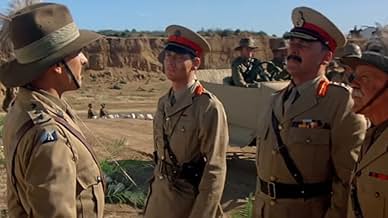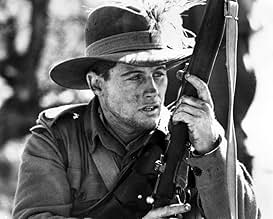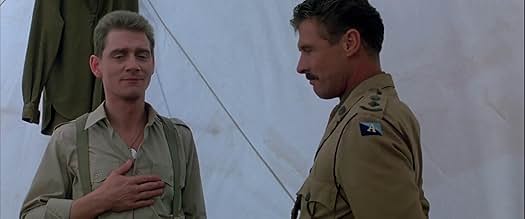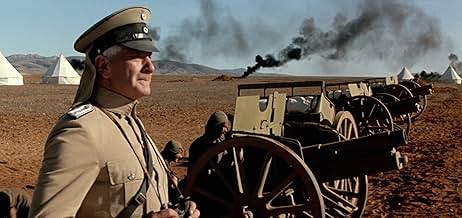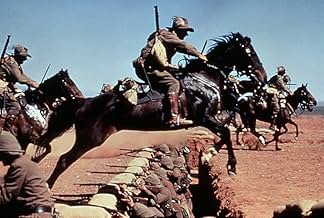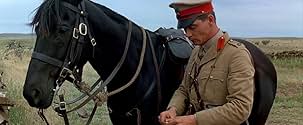CALIFICACIÓN DE IMDb
6.8/10
2.2 k
TU CALIFICACIÓN
En 1917, cuando las fuerzas británicas están empantanadas frente a las líneas turcas y alemanas en Palestina, confían en el regimiento australiano de caballos ligeros para salir del atollade... Leer todoEn 1917, cuando las fuerzas británicas están empantanadas frente a las líneas turcas y alemanas en Palestina, confían en el regimiento australiano de caballos ligeros para salir del atolladero.En 1917, cuando las fuerzas británicas están empantanadas frente a las líneas turcas y alemanas en Palestina, confían en el regimiento australiano de caballos ligeros para salir del atolladero.
- Dirección
- Guionista
- Elenco
- Premios
- 2 premios ganados y 1 nominación en total
Jack Heywood
- Dave's Dad
- (as John Heywood)
- Dirección
- Guionista
- Todo el elenco y el equipo
- Producción, taquilla y más en IMDbPro
Opiniones destacadas
Historically accurate and meticulously researched, this is one of the genre of "federation-era" war productions in the 1980's by the Australian film industry. The high-quality movies and mini-series of this collection included such titles as "Breaker Morant", "Gallipoli" and "ANZACS", and one can see obvious similarities in the techniques and methodology used in their production. This, however, does not detract from their appeal or their entertainment value; quite the reverse, in fact. The formula for this genre was to take an historically-documented campaign and translate it as faithfully as possible to the big screen, with emphasis on characterisation, accuracy of detail and background.
The formula works, because the characters are believable, and the situations, events and settings have been faithfully re-created. Much of the background and information for this genre came from personal diaries and military archives preserved over the years, which adds credence to the plots, the action and the stories.
"The Lighthorsemen" highlights the campaign of the Australian mounted rifles in the North Africa battleground of the Great War, and culminates with the last successful action of horse-riding troops in combat. Without giving away the story too much, the taking of Beersheba in the closing days of 1918 was a decisive event in military history, and the screen portrayal of this action will have you on the edge of your seat.
Masterful performances by Jon Blake, Shane Briant and Bill Kerr (all veterans of this movie formula,) the attention to detail, the drama, and the occasional humour make for a very entertaining movie. It's recommended viewing.
The formula works, because the characters are believable, and the situations, events and settings have been faithfully re-created. Much of the background and information for this genre came from personal diaries and military archives preserved over the years, which adds credence to the plots, the action and the stories.
"The Lighthorsemen" highlights the campaign of the Australian mounted rifles in the North Africa battleground of the Great War, and culminates with the last successful action of horse-riding troops in combat. Without giving away the story too much, the taking of Beersheba in the closing days of 1918 was a decisive event in military history, and the screen portrayal of this action will have you on the edge of your seat.
Masterful performances by Jon Blake, Shane Briant and Bill Kerr (all veterans of this movie formula,) the attention to detail, the drama, and the occasional humour make for a very entertaining movie. It's recommended viewing.
I saw only the last half of this one, appropriately enough on Anzac Day, tuning in just as the delicious Nurse Siggy Thornton is writing a love letter that intelligence Major Anthony Andrews is going to mislead Johnny Turk with. So I missed the alleged tedium of the first hour. The film is no doubt best viewed on a big screen, but what I did see in the last hour was the Australian Light Horse attack on Beersheba, brilliantly staged and filmed, with hundreds of horses and extras and tonnes of dramatic tension.
The actual battle was an Aussie military success, due in large part to their opponents, especially the Germans, underestimating them. It was a change from Gallipoli, where some of the horsemen had fought a couple of years earlier. It was terribly thoughtful of the Australian commanders to order the attack an hour before sunset when the light is best, and Dean Semler the cinemaphotographer takes full advantage of it. The close camera shots in the battle really give you the feeling you're right in it - there is nothing particularly original about "Saving Private Ryan" made 10 years later.
Yes, it's a cliché-ridden and chauvinistic script. The real villains are the Germans, all from Central Casting's Nazi division, despite this being a movie about the FIRST World War, but the British officers are also portrayed as pretty perfidious - the guys who made snobbery an art form to cover their incompetence. The Turks, though, are shown as brave and worthy opponents, if a little under the Germans' thumb. No doubt John Ford would have done it differently (I'm not sure he would have handled the horses any better) but this is the Australian point of view. A Turkish version would be interesting.
Anyway, worth it for the final battle.
The actual battle was an Aussie military success, due in large part to their opponents, especially the Germans, underestimating them. It was a change from Gallipoli, where some of the horsemen had fought a couple of years earlier. It was terribly thoughtful of the Australian commanders to order the attack an hour before sunset when the light is best, and Dean Semler the cinemaphotographer takes full advantage of it. The close camera shots in the battle really give you the feeling you're right in it - there is nothing particularly original about "Saving Private Ryan" made 10 years later.
Yes, it's a cliché-ridden and chauvinistic script. The real villains are the Germans, all from Central Casting's Nazi division, despite this being a movie about the FIRST World War, but the British officers are also portrayed as pretty perfidious - the guys who made snobbery an art form to cover their incompetence. The Turks, though, are shown as brave and worthy opponents, if a little under the Germans' thumb. No doubt John Ford would have done it differently (I'm not sure he would have handled the horses any better) but this is the Australian point of view. A Turkish version would be interesting.
Anyway, worth it for the final battle.
This is a story about some episode British-Turk campaign in Palestine in 1917. Very important role in this campaign was played by Australian forces. The key to conquer the Holy Land is city of Gaza. British general wants however to throw his forces to bypass the city and capture another one - Beersheba. To take them both it is necessary to keep his plan secret.
As a person who is interested in all WWI history I was waiting for this movie. I find it very good. All equipment seems to be very accurate, however, I've never heard about use of tanks in this front. There is a nice scene of air attack by German biplane, cars from that times, uniforms, and so on -- it all seems to be historical correct. The final charge is worth waiting for. I think that anyone who is interested in this campaign would be satisfied.
Because of Australian point of view the role of British army seems to be a little underrated. I especially mean British commander -- general Allenby. I think it would be good to say at the very end that after capturing Beersheba, Gaza fell as well a week later, and the road to Jerusalem was opened. This was what was lacking for me.
As a person who is interested in all WWI history I was waiting for this movie. I find it very good. All equipment seems to be very accurate, however, I've never heard about use of tanks in this front. There is a nice scene of air attack by German biplane, cars from that times, uniforms, and so on -- it all seems to be historical correct. The final charge is worth waiting for. I think that anyone who is interested in this campaign would be satisfied.
Because of Australian point of view the role of British army seems to be a little underrated. I especially mean British commander -- general Allenby. I think it would be good to say at the very end that after capturing Beersheba, Gaza fell as well a week later, and the road to Jerusalem was opened. This was what was lacking for me.
I have watched this movie at least five times. Initially, I was a little disappointed by the tedium of the first half of the movie. I began to realize, however, that the first half of the movie is a pretty good reflection of military life prior to the second half of the 20th century: long periods of boredom and routine punctuated by major confrontations.
I've noticed that a few reviewers have remarked on the final "cavalry charge," which suggests to me that they really weren't paying much attention to the movie. The final charge on the Turkish positions is so much more awe-inspiring given the usual tactics of the Lighthorsemen. One of the most thrilling moments is when the Aussies prepare to meet the enemy on horseback and, instead of pulling out the classic cavalrymen's sabers, draw their bayonets for the charge. You almost want to laugh at the sight of 16" knives against the well-emplaced Turks.
This is one of the few war movies based on actual events that is fairly accurate, too. Take a look at some of the sites dedicated to the 4th Light Horse Briagde and you will see what I mean. A letter from one of the actual participants to his brother is an almost perfect description of the events as shown in the movie.
**** out of ***** if only for the charge
I've noticed that a few reviewers have remarked on the final "cavalry charge," which suggests to me that they really weren't paying much attention to the movie. The final charge on the Turkish positions is so much more awe-inspiring given the usual tactics of the Lighthorsemen. One of the most thrilling moments is when the Aussies prepare to meet the enemy on horseback and, instead of pulling out the classic cavalrymen's sabers, draw their bayonets for the charge. You almost want to laugh at the sight of 16" knives against the well-emplaced Turks.
This is one of the few war movies based on actual events that is fairly accurate, too. Take a look at some of the sites dedicated to the 4th Light Horse Briagde and you will see what I mean. A letter from one of the actual participants to his brother is an almost perfect description of the events as shown in the movie.
**** out of ***** if only for the charge
This movie also has to go on my "desert island" list. What most people will say is that the first hour is about as exciting as watching paint dry, which is true to a point. But wars are often played like chess, and if you don't know the board you'll never understand the game. It's therefore necessary, though somewhat tedious, to show the situation, terrain, weather, and overall political climate to get to the historical charge. The Germans are played perhaps a little too stiffly, and the one Aussie who couldn't shoot a human and became a medic was perhaps given a little too much screen time. As for the charge itself, you can hear your heart beating faster as you literally smell the sweat from the horses. The two-mile charge against an entrenched enemy supported with machine gun, razor wire, and cannon is intense beyond words, and stands as some of the most awesome cinematography I've ever seen. Actual casualty stats are listed, which are surprisingly low. As for how the horses were handled, not one was injured-a feat you'll scarcely believe after having seen the charge. The Lighthorsemen, unlike Gallipoli, is well worth a look. -Chuck
¿Sabías que…?
- TriviaWebsite Cinephilia reports of the Jon Blake accident and legal case: "Jon Blake was critically injured whilst driving home on December 1, 1986, after the final day's filming of The Lighthorsemen (1987). He sustained severe brain injuries and in December, 1995, the New South Wales Supreme Court ruled that Blake should be compensated for the loss of potential earnings as a star in the United States. After taking evidence from actors, directors, and film critics who indicated his career could have been as big as Mel Gibson's, the court awarded him $32 million in damages. This was later reduced to $7 million after the defence appealed."
- ErroresAt the rest camp just after the 2 soldiers pass the British Major and addresses the Colonel about the men wearing shorts at the end the Colonel calls the Major 'Sir', this wouldn't happen as a Colonel is a higher rank to Major.
- Versiones alternativasUK versions are cut by 6 secs to remove cruel horsefalls.
- ConexionesEdited into The Young Indiana Jones Chronicles: Palestine, October 1917 (1993)
- Bandas sonorasAUSTRALIA WILL BE THERE
Music and lyrics by W.W. 'Skipper' Francis
By Arrangement with Allans Music (Australia) Pty. Limited
Selecciones populares
Inicia sesión para calificar y agrega a la lista de videos para obtener recomendaciones personalizadas
- How long is The Lighthorsemen?Con tecnología de Alexa
Detalles
- Fecha de lanzamiento
- País de origen
- Sitios oficiales
- Idioma
- También se conoce como
- The Light Horse Men
- Locaciones de filmación
- St. Kilda, Melbourne, Victoria, Australia(beach, Mediterranean Sea)
- Productoras
- Ver más créditos de la compañía en IMDbPro
Taquilla
- Presupuesto
- AUD 10,500,000 (estimado)
- Total en EE. UU. y Canadá
- USD 33,779
- Fin de semana de estreno en EE. UU. y Canadá
- USD 23,645
- 10 abr 1988
- Total a nivel mundial
- USD 34,514
- Tiempo de ejecución
- 2h 11min(131 min)
- Mezcla de sonido
- Relación de aspecto
- 2.35 : 1
Contribuir a esta página
Sugiere una edición o agrega el contenido que falta

